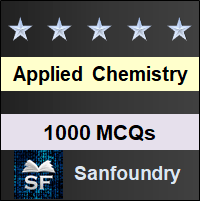
Applied Chemistry Multiple Choice Questions Highlights
- 1000+ Multiple Choice Questions & Answers (MCQs) in Applied Chemistry with a detailed explanation of every question.- These MCQs cover theoretical concepts, true-false(T/F) statements, fill-in-the-blanks and match the following style statements.
- These MCQs also cover numericals as well as diagram oriented MCQs.
- These MCQs are organized chapterwise and each Chapter is futher organized topicwise.
- Every MCQ set focuses on a specific topic of a given Chapter in Applied Chemistry Subject.
Who should Practice Applied Chemistry MCQs?
– Students who are preparing for college tests and exams such as mid-term tests and semester tests on Applied Chemistry.- Students who are preparing for Online/Offline Tests/Contests in Applied Chemistry.
– Students who wish to sharpen their knowledge of Applied Chemistry Subject.
- Anyone preparing for Aptitude test in Applied Chemistry.
- Anyone preparing for interviews (campus/off-campus interviews, walk-in interview and company interviews).
- Anyone preparing for entrance examinations and other competitive examinations.
- All - Experienced, Freshers and College / School Students.
Applied Chemistry Chapters
Here's the list of chapters on the "Applied Chemistry" subject covering 100+ topics. You can practice the MCQs chapter by chapter starting from the 1st chapter or you can jump to any chapter of your choice.- Fuel Technologies
- Lubricants
- Green Chemistry
- Nano Materials
- Non Conventional Energy Sources and Storage Device
- High Polymers and Plastics
- Water
- Electro Chemical Cells and Corrosion
1. Fuel Technologies
The section contains multiple choice questions and answers on good fuel characteristics and advantages, calorific value, dullongs formula, solid fuels, coal and selection analysis, crude oil classification, petroleum mining, cracking and knocking, power alchols and fuel technologies problems.
2. Lubricants
The section contains questions and answers on lubricants selection and classification, additives types, lubrication mechanism, viscosity and viscosity index, neutralization number, saponification value, cloud and pour point, oxidation stability and aniline number.
3. Green Chemistry
The section contains MCQs on synthesis methods, green chemistry needs and principles.
|
|
|
4. Nano Materials
The section contains multiple choice questions and answers on fullerenes and their properties, graphite, carbon nano tubes, cnt properties, super conductors, sol-gel method, applications of nano materials, nano wires and cones.
5. Non Conventional Energy Sources and Storage Devices
The section contains questions and answers on solar energy applications, photovoltaic cell, hydro power, geothermal energy, tidal and wave power, ocean thermal energy conversion, biomass and biofuel.
6. High Polymers and Plastics
The section contains MCQs on polymers types, polymerization methods and mechanism, polymers properties, plastics, plastics compounding, properties and applications of compounds, elastromers applications, natural and synthetic rubbers.
7. Water
The section contains multiple choice questions and answers on souces, impurites and hardness of water, hardness estimation, lime washing soda method, permutits and ion exchange process, water pollutants types, water pollution methods, biological oxidation process, reverse osmosis, cod and bod, problems and formulas, water pollution control and monitoring.
8. Electro Chemical Cells and Corrosion
The section contains questions and answers on electro chemical cells, fuel cells and its types, corrosion, protective coatings, corrosion and passivity types.
|
|
|
Wish you the best in your endeavor to learn and master Applied Chemistry!
